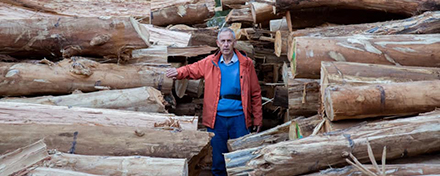Lawfare. It’s a word that first saw the light of day, it is said, in the 1975 manuscript Whither Goeth the Law, which argues that the Western legal system has become overly contentious, and utilitarian as compared with the more humanitarian, norm-based Eastern system.
More recently, it has become the word of choice to describe the conservation lobby’s persistent – one could say vexatious – litigation designed to tie the timber down in legal red tape.
Sustainable Timber Tasmania and VicForests have been the obvious victims of late.
The Bob Brown Foundation earlier this year was hounding STT.
However, in June the foundation failed in its High Court bid aimed at overturning Tasmania’s Regional Forest Agreement. In a legal challenge dubbed the “Great Forest Case“ the foundation had sought leave to appeal a Federal Court judgement that agreed with Sustainable Timber Tasmania that there is a broader suite of environmental protections in force in Tasmania.
The foundation argued Tasmania’s regional forestry agreement was invalid because it did not properly protect threatened native animals.
The decision, to a slight degree, appeared to curb the foundation’s enthusiasm for the cause, although it’s doubtful the foundation would see it that way.
They never do. They would see keeping STT tied up in litigation at huge expense as a win.
Then came VicForests. The number of injunctions issued by conservation groups over logging – coupe by coupe – has had an enormous impact on VicForests.
VicForests’ latest annual report shows it “has been the respondent to an unprecedented volume of third-party litigation”, which locks up coupes, delays harvesting and forces VicForests to pay harvest and haulage contractors compensation as it struggles to meet contracted log volumes.
“These cases, brought by groups opposed to sustainable native timber harvesting are founded on claims that VicForests has or will breach its regulatory obligations flowing from the Code of Practice for Timber Production 2014,” the report said.
VicForests has put the cost at $4.8 million in 2020-21, and it appears the 2021-22 financial year is off to a bad start.
Even when VicForests wins cases it has struggled to recover court-awarded costs against environment groups.
This led the Member for Narracan Gary Blackwood this week to call on Victoria’s Premier to introduce legislation stopping third-party litigation.
Mr Blackwood told State Parliament this week radical green groups “are intent on closing the native forest timber industry down, using court injunctions to stop VicForests from accessing timber areas that have been approved and placed on the timber release plan for harvesting”.
“Just last week injunctions were imposed on 29 coupes across the Central Highlands and East Gippsland, effectively bringing the harvesting contractors to an immediate halt,” Mr Blackwood said.
The judge presiding over the case had reserved his judgement.
“All of these injunctions have been supported by false science and misinformation, which is why VicForests have won every case brought against them,” Mr Blackwood said.
But he said the time involved in the court process had seriously hampered legitimate harvesting and had now led to sawmills and processors having to stand workers down because of lack of supply.
He told parliament that VicForests had to pay compensation to customers and contractors for failing to supply product and work as per contractual agreements.
There are, Mr Blackwood said, two issues at play here: firstly, the ability for a government agency to be subject to third party litigation that has proven to be vexatious; and secondly, a breach of the promise made by the Andrews government in their forest plan to maintain current supply to VicForests customers until July 2024.
Good point Mr Blackwood, but a point that will probably fall on deaf ears.
He also pointed out that government agencies such as the EPA have protection through legislation from litigation. The New South Wales government has also passed legislation that protects their forest industry from third party litigation.
Another good point Mr Blackwood, but a point that will again probably fall on deaf ears.
He posed the question: why does Victoria’s Dan Andrews continue to leave his government’s commercial arm of forestry exposed to vexatious third-party litigation designed to cripple the industry?
The cynical among us could easily be drawn to the conclusion that Mr Andrews is happy with the situation that sees conservation groups choose lawfare to shut down the native timber in Victoria.
The cynical among us could also easily be drawn to the conclusion that by taking this approach Mr Andrews can say his hands are clean.
They aren’t.






